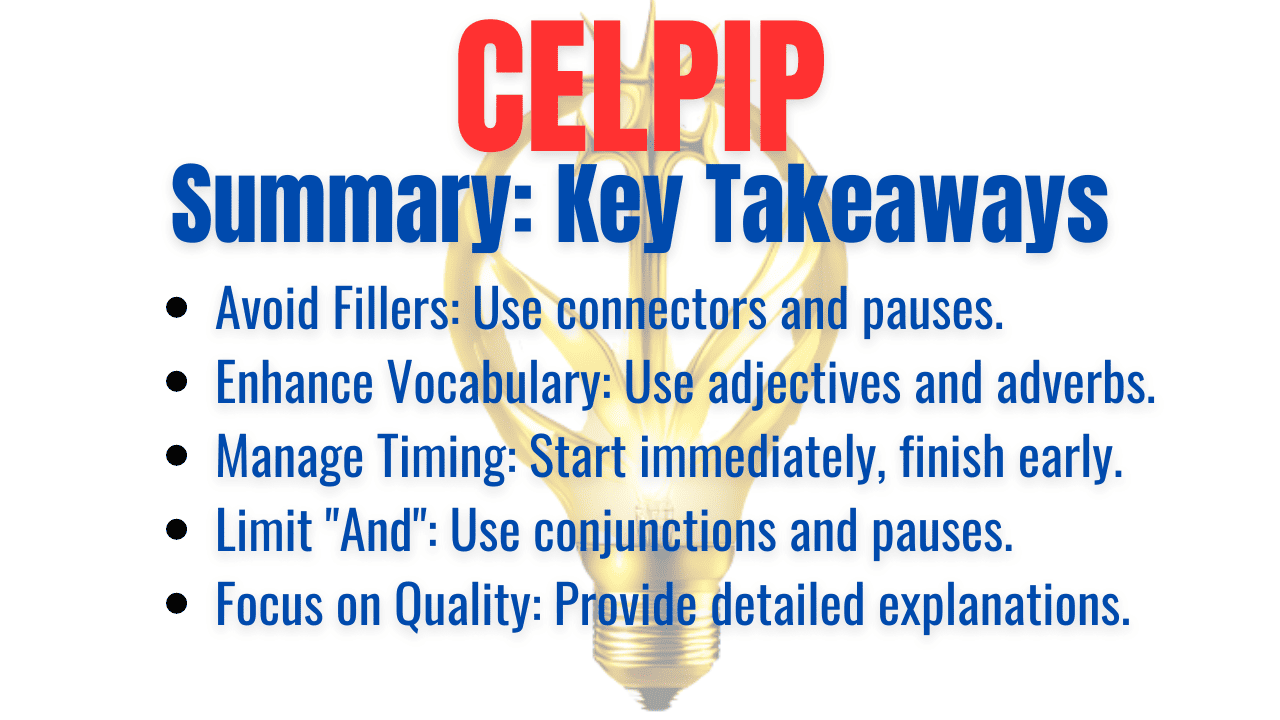Failed CELPIP? Use These Life-Saving Tips For Your Next Exam!
Eight Reasons Why Students Fail CELPIP and the Best Tips!
In today’s blog, we’ll cover eight key reasons why students often fail the CELPIP exam (which is why you need to work on these tips!). These are common objections and mistakes that I’ve observed over many years of teaching. If you’re preparing for the CELPIP, avoid these pitfalls to increase your chances of success.
Before diving into the reasons, let’s hear from a successful student:
“I got my desired results with the help of HZAD Education and their brilliant content. Trust me when I say this: buy their course and give the exam, and you will definitely get your desired score.”
This student, like many others, achieved their goals by following our advice. Now, let’s discuss the common mistakes that lead to failure.
1. Not Enough Preparation Time
Problem:
Many students think they can prepare for the CELPIP exam in just a few days. They book the exam for the upcoming weekend, giving themselves only 2-3 days to study.
Solution:
To avoid this mistake, allocate at least 2-3 weeks for preparation. Whether you’re taking coaching or studying independently, proper preparation time is crucial.
Example:
A student who booked their exam within a few days failed because they underestimated the difficulty and the preparation needed. Instead, give yourself ample time to study and practice.
2. Lack of Revision
Problem:
Students often fail to revise their mistakes. They might use tools like Grammarly or receive feedback from tutors but do not put in the effort to correct their mistakes thoroughly.
Solution:
Revise your errors multiple times until you master them. Practice each correction at least 5 to 10 times over a few days to ensure you don’t repeat the same mistakes.
Example:
A student who received feedback about incorrect use of commas ignored the advice and continued making the same errors. By revising those mistakes multiple times, the student could have improved their writing significantly.
3. Inadequate Exam Pacing
Problem:
Students are not accustomed to sitting for the full duration of the CELPIP exam, which lasts over 3 hours. This leads to nervousness and fatigue during the actual exam.
Solution:
Simulate the exam environment at home by practicing all four modules continuously for three hours or more. This will help build your endurance and familiarity with the exam setting.
Example:
A student who practiced sitting for three-hour sessions at home performed better on exam day because they were used to the long duration.
4. Underestimating CELPIP 9
Problem:
Many students think achieving a CELPIP score of 9 is easy. They assume it’s just an English exam and that scoring high won’t be challenging.
Solution:
Understand that scoring a 9 means making no mistakes and using advanced vocabulary and perfect grammar. Familiarize yourself with CELPIP-specific criteria to meet the examiner’s expectations.
Example:
A native English speaker failed to score a 9 because they didn’t meet the CELPIP criteria, despite having strong English skills. Following the exam’s specific requirements is essential.
5. Switching to IELTS
Problem:
Some students, frustrated with CELPIP, switch to IELTS, thinking it might be easier. However, IELTS often has a more challenging writing section where many students struggle.
Solution:
Stick with CELPIP, especially if you have already gained some experience with it. If you’re unsure which exam is better for you, seek advice from experts.
Example:
A student switched from CELPIP to IELTS, only to find the latter more difficult and eventually returned to CELPIP. Consistency in preparation is key.
6. Listening to Friends
Problem:
Students often rely on their friends’ opinions about their English skills rather than seeking professional feedback. Friends may not have the expertise needed to provide accurate assessments.
Solution:
Trust professional tutors and teachers who have experience with CELPIP and know what the examiners look for.
Example:
A student believed their friend’s assessment of their writing skills, which led to a lower-than-expected score. Professional feedback could have provided a more accurate evaluation.
BEST FREE CELPIP Videos and Advice: Hzad Education – Coaching Central
7. Inadequate Vocabulary
Problem:
Students underestimate the vocabulary required for CELPIP. They think basic English will suffice and don’t focus on using advanced words and structures.
Solution:
Use advanced vocabulary and complex sentences in your responses. Avoid basic words like “good” or “bad” and opt for more sophisticated language.
Example:
A student who focused on enhancing their vocabulary and using complex sentence structures achieved a higher score, meeting the CELPIP criteria.
8. Not Making Outlines
Problem:
When writing tasks, students often start writing immediately without outlining their responses. This leads to forgetting the question and deviating from the topic halfway through their essay.
Solution:
Spend 2-3 minutes creating an outline before writing. Jot down key points for each paragraph to stay on track.
Example:
A student who made outlines before writing was able to stay focused on the topic and produced a coherent essay, resulting in a better score.
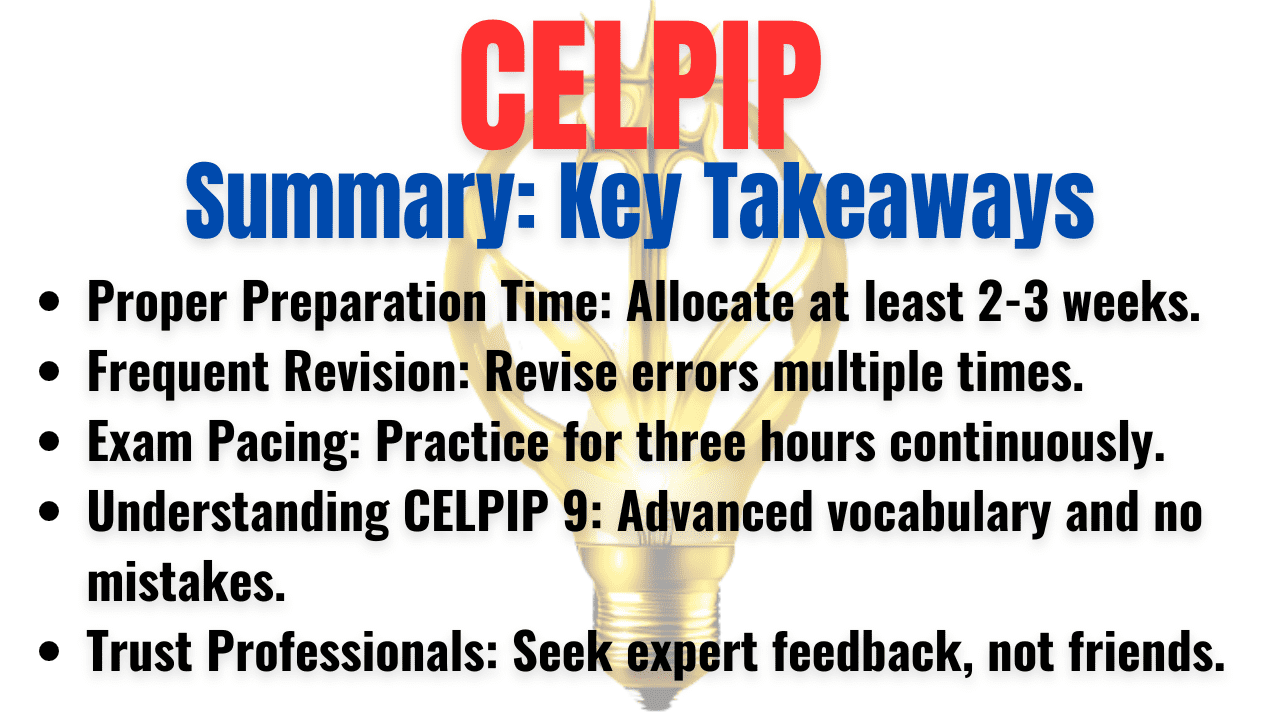
Mastering CELPIP Speaking: Avoiding Common Pitfalls
CELPIP speaking questions, particularly questions five and seven, often trip up many test-takers. These questions require a unique blend of comparison, persuasion, and passionate debate, which can be challenging if you’re not prepared. In this blog, we will dissect why people lose marks on these questions and provide you with effective strategies to excel.
Understanding Questions 5 and 7
Question 5: Comparison and Persuasion
The Challenge:
Question 5 requires you to compare two options and persuade the listener towards one. Many test-takers lose marks because they either do not compare effectively or lack persuasive elements in their speech.
The Solution:
To tackle this question, ensure you compare both options directly and persuasively. Here’s how to do it correctly with an example:
Example Question Task 1: “Talk to your nephew who has some money and is deciding whether to buy a robot or a drone.”
Answer 1: “Hey Bob, how’s it going? I heard you have some extra money, which is awesome. I think you should definitely use that to buy the robot. Although it’s expensive at $9,000, it speaks multiple languages and dances around, which could be very entertaining. On the other side, the drone is much cheaper at $2,000 and has a good camera, but the range is limited. I would say go with the robot.”
Answer 2: “Hey Bob, how’s it going? I heard you have some extra cash, which is amazing. You should invest in the robot, even though it’s $7,000 more than the drone. Robots are the technology of the future, and this one speaks multiple languages, which means you can learn a lot. The drone has a high-resolution camera, but you don’t really need it since you don’t take pictures often. Stick with the robot; it’s a great investment.”
Analysis: In the second answer, notice the excitement and emphasis. The comparison is more direct, and the persuasive elements are stronger. The speaker addresses both options in the same sentences, making the comparison clear and compelling.
Question 7: Passionate Debate
The Challenge:
Question 7 often requires you to take a stance on a controversial issue and argue passionately. Many students fail to inject enough emotion and conviction into their responses.
The Solution:
Choose an opinion you strongly believe in and argue with passion. Organize your points well and ensure your tone reflects your commitment to the topic.
Example Question: “Should child protective services be given more power to take away children in cases of minor abuse?”
Sample Answer: “The topic of child protective services is very serious. Among all government institutions, this one should get the most power. Firstly, they are not known for corruption, unlike other government bodies. Secondly, many parents are incapable due to mental illness or drug use. Lastly, some parents, despite loving their children, cannot provide a safe environment. Child protective services can protect these children. Hence, I fully support giving them more power.”
Analysis: This answer is organized into three points, each given 20 seconds. The tone is passionate, reflecting a strong belief in the argument. This approach demonstrates the necessary debate skills and emotional engagement required for a high score.
Key Tips for CELPIP Speaking Success
1. Use Direct Comparisons
When comparing two options, mention both in the same sentence to highlight differences clearly. For example, instead of listing all features of one option and then the other, mix them up: “The robot, though expensive, offers advanced features like language skills, whereas the drone is cheaper but has a good camera.”
2. Show Passion and Emphasis
Passion can make a significant difference in your score. Use variations in tone, volume, and emphasis to convey your enthusiasm and conviction. This is especially important in questions requiring debate and persuasion.
3. Structure Your Responses
Organize your answers into clear points. For example, in a one-minute response, spend 20 seconds on each of three points. This helps maintain clarity and focus.
4. Practice with Templates
Familiarize yourself with speaking templates that provide a structured approach to different types of questions. Templates can help ensure you cover all necessary points within the time limit.
5. Continuous Improvement
Regular practice and seeking feedback from experts can help you identify and correct mistakes. Utilize tools and feedback effectively to refine your speaking skills.
Avoiding common pitfalls in CELPIP speaking questions can significantly enhance your performance. By focusing on direct comparisons, showing passion, structuring your responses, using templates, and continually improving, you can overcome the challenges of questions five and seven. Practice these strategies, and you’ll be well on your way to achieving your desired CELPIP score.
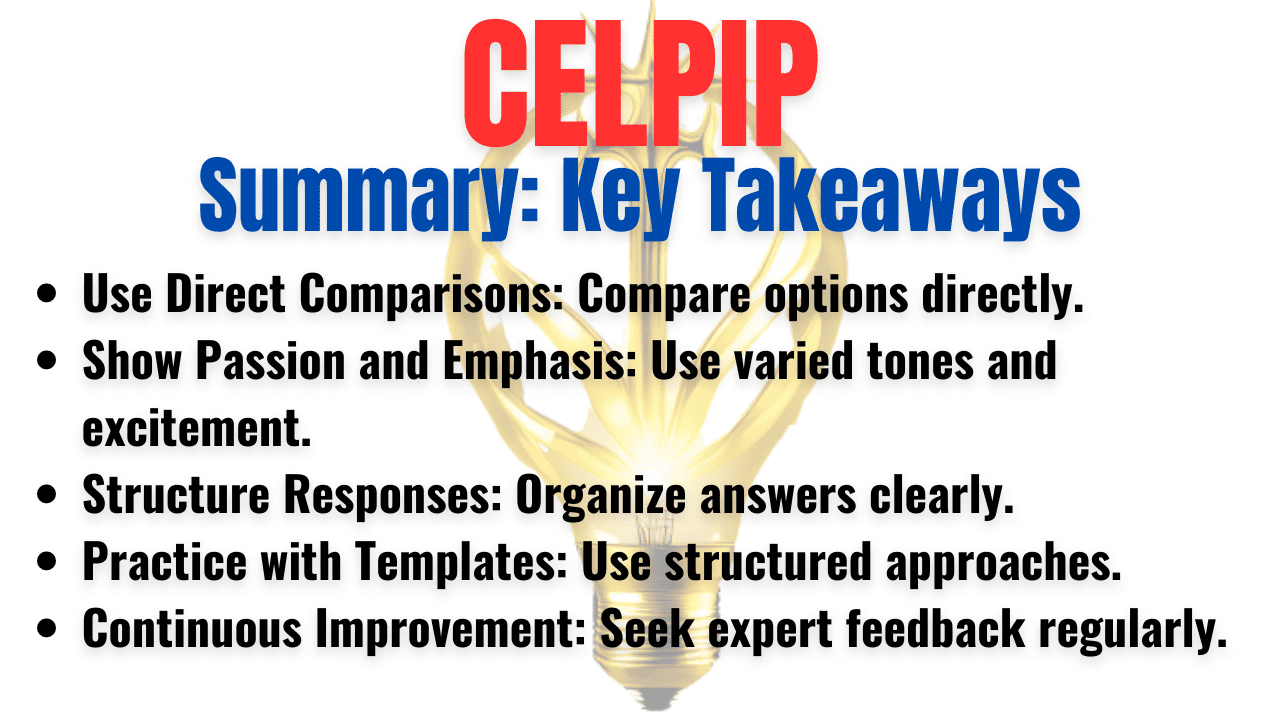
Three Main Reasons Why People Fail the CELPIP Exam
In this blog, we’ll explore the three main reasons why people fail the CELPIP exam. We’ll dive deep into these issues and provide strategies to improve. Whether you’ve failed once or multiple times, this guide will help you understand and overcome common pitfalls.
1. Task Response
What is Task Response?
Task response refers to how well you answer the question in writing and speaking sections. It’s about clarity, relevance, and detail in your explanations. Since human examiners evaluate these sections, subjective opinions can affect your scores.
Examples of Weak Task Responses
Weak Explanation: Suppose you need to discuss whether to build a shopping mall or a zoo. A weak response might be: “We already have a shopping mall, so we don’t need another one.” This lacks depth and fails to convince the examiner.
Irrelevant Explanation: Another weak response might be: “We shouldn’t build a shopping mall because we need more playgrounds.” While this point is valid, it’s irrelevant to the question of comparing a shopping mall to a zoo.
Strategy to Improve Task Response
Why and How Approach:
- Why: Explain the reasoning behind your point. For example, “Building a shopping mall will increase unproductivity in society because people will spend more time and money there instead of engaging in beneficial activities.”
- How: Provide details and examples to support your reasoning. For example, “A shopping mall would consume significant resources that could be used to create community centers that foster social interactions and education.”
2. Grammar
Importance of Grammar
Grammar is crucial in writing and speaking sections. Making more than two to three grammar mistakes can significantly lower your score. Even minor errors can impact your overall performance.
Improving Grammar
- Online Grammar Quizzes: Utilize online resources to practice grammar.
- Grammarly: Use tools like Grammarly to check your work and understand your mistakes.
- Professional Coaching: Consider investing in coaching sessions to get personalized feedback and guidance.
Common Grammar Issues
Many students struggle with basic grammar rules, such as subject-verb agreement, tense consistency, and proper use of punctuation. Improving these areas can lead to a substantial score increase.
3. Vocabulary
The Role of Vocabulary
Vocabulary affects all four sections of the CELPIP exam. A rich and varied vocabulary helps in understanding reading and listening passages and enhances the quality of writing and speaking responses.
Expanding Vocabulary
- Use Advanced Words: Avoid basic words like “good” and “bad.” Instead, use more sophisticated alternatives.
- Complex Sentences: Combine simple and complex sentences. For example, “Due to the extreme weather, I cannot go outside today,” shows complexity and range.
- Adjectives and Adverbs: Incorporate descriptive words to add depth to your responses.
Vocabulary in Action
In writing and speaking, make sure to use a range of vocabulary that includes adjectives, adverbs, and transitional phrases. This not only improves clarity but also demonstrates a higher level of proficiency.
What to Do If You Fail
Reevaluation
If your speaking and writing scores are just one or two points below your target, consider requesting a reevaluation. This can sometimes result in a higher score as these sections are subjectively marked by humans.
Retake the Exam
If your scores are significantly below your target (e.g., three points or more), it’s better to retake the exam. Prepare thoroughly, focus on your weak areas, and use the strategies mentioned in this blog.
Avoid Switching to IELTS
Switching to IELTS out of frustration is not advisable. CELPIP is generally considered easier, especially in the writing section. Stick with CELPIP and continue to improve your skills.
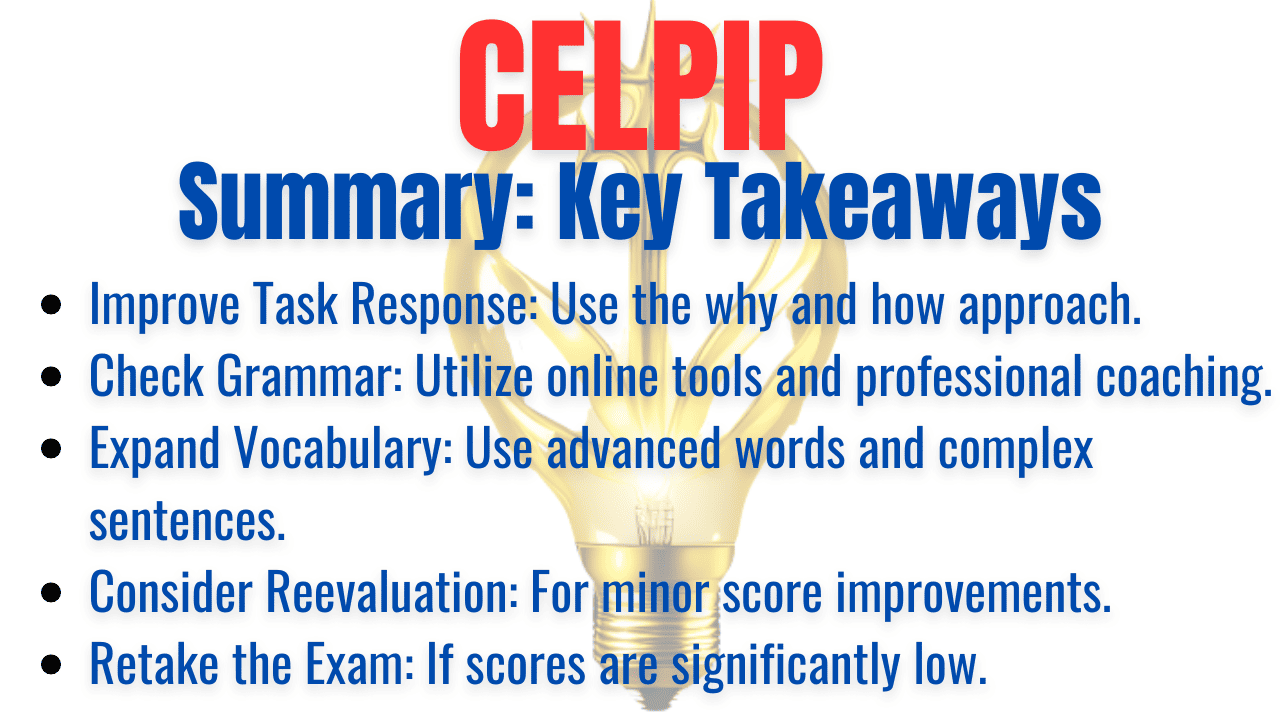
Dealing with CELPIP Exam Failures: Strategies and Solutions
Many students face difficulties with the CELPIP exam, often failing multiple times before seeking help. In this blog, we’ll discuss the common struggles, provide practical solutions, and offer guidance on how to improve your scores and avoid common pitfalls.
Understanding the Struggles
Common Queries from Students
We frequently receive queries from students who have failed the CELPIP exam multiple times. For instance, one student failed both CELPIP and IELTS a combined total of 25 times before seeking our help. Although this case is extreme due to her unique mental health issues, it illustrates that persistent failure is not uncommon.
Facing Frustration and Legal Concerns
Some frustrated students consider paying for a fraudulent CELPIP certificate. This is highly discouraged as it can lead to severe legal consequences and financial loss. Scammers often charge between $5,000 to $10,000, and such actions will not result in receiving a legitimate certificate.
Giving Up is Not an Option
In my eight years of teaching, I have only seen two students give up on their dreams. Giving up means sacrificing your goals, so it’s crucial to find ways to improve instead of quitting.
Why do students fail CELPIP? This course not only explains that but GUARANTEES your results or your MONEY-BACK! With 100,000 copies sold, check out why this course has internet’s best reviews (IMMEDIATE ACCESS AVAILABLE): Hzad Education Celpip Classes
Strategies for Improvement
Switching Exams
Switching to IELTS from CELPIP is a common instinct, but it’s not always effective. Here’s why:
Reading and Listening: The difficulty levels in these modules are similar across both exams. Therefore, switching exams might not yield better results in these sections.
Writing and Speaking:
- IELTS Writing: This is marked very strictly, and many students struggle here.
- CELPIP Writing: Generally easier, but speaking is harder.
Example Scenario: If you score well in reading and listening but poorly in speaking on CELPIP, switching to IELTS might be beneficial as IELTS speaking is slightly easier. Conversely, if your writing is weak, sticking with CELPIP is advisable as improving your writing score in IELTS is significantly harder.
Taking Courses and Coaching
Investing in professional coaching or courses can provide personalized feedback and structured learning. Our self-paced courses and live classes offer customized feedback and are designed to help you improve efficiently. We also offer a money-back guarantee to ensure you get the best results without financial risk.
Free Resources and Self-Diagnosis
If budget constraints prevent you from investing in courses, utilize free resources available on our blog and YouTube channel. Practice with our materials and self-diagnose your weaknesses.
Self-Diagnosis Example:
- Reading Module: If vocabulary is an issue, work on expanding your vocabulary with a thesaurus. If paraphrasing is a problem, practice identifying synonyms.
- Listening Module: Practice to improve speed and concentration.
Importance of Taking Time
Many students rush to retake the exam after failing, which is counterproductive. Give yourself adequate time to practice and improve:
Guidelines:
- Improving by One Point: For reading, listening, and writing, allocate 1-2 weeks per module.
- Improving Speaking: This is more challenging and requires 2-3 weeks per point.
Practical Tips and Recommendations
Continuous Practice and Monitoring
Practice regularly and monitor your progress. Use online resources, practice tests, and seek feedback to identify areas needing improvement.
Reevaluation vs. Retaking the Exam
If your speaking and writing scores are just one or two points below your target, consider requesting a reevaluation. If your scores are significantly lower, it’s better to retake the exam after thorough preparation.
Utilizing Templates and Structure
Familiarize yourself with speaking and writing templates to structure your responses effectively. Templates help ensure that you cover all necessary points within the time limit.
Seeking Expert Guidance
If you’re confused or unsure about your progress, email us at info@HZADeducation.com for personalized recommendations based on your scores and needs.
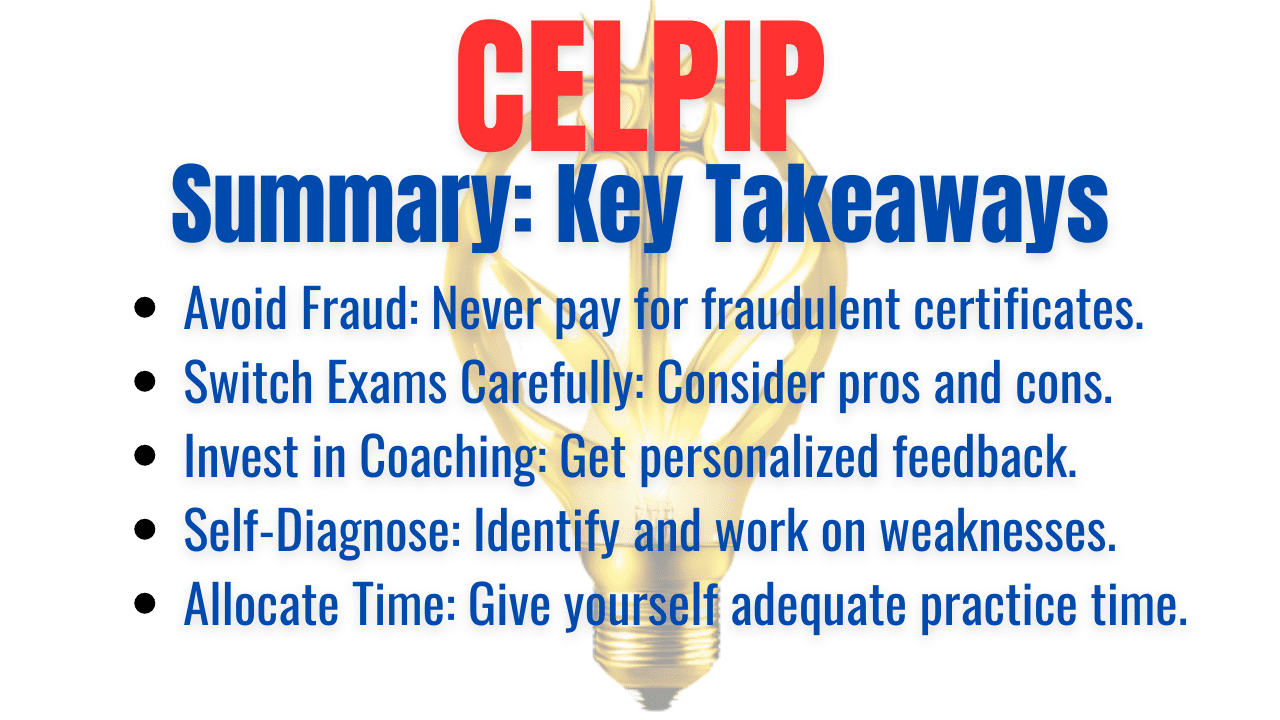
Mastering CELPIP Speaking: Avoiding Common Pitfalls
CELPIP speaking is one of the hardest modules of the exam, and many test-takers struggle to achieve high scores. This blog will discuss five common mistakes that lead to failure in CELPIP speaking and provide strategies to overcome them. Utilizing these tips will help you improve your speaking skills and increase your chances of success.
1. Overuse of Fillers
The Issue with Fillers
Using fillers like “um,” “you know,” “like,” and even “so” excessively can significantly impact your speaking score. Fillers indicate a lack of confidence and disrupt the flow of your speech.
Solutions to Avoid Fillers
- Replace Fillers with Connectors: Instead of saying “um,” use connectors like “therefore,” “thus,” or “hence.”
- Utilize Pauses: Pausing shows confidence and allows you to gather your thoughts. For example, instead of saying “um,” take a brief pause before continuing your sentence.
Example:
- Before: “Um, I think, um, the robot is, like, better because it can, um, dance.”
- After: “I believe the robot is better because it can dance.”
Avoiding “Etc.”
Using “etc.” is another common filler that can weaken your response. Instead, provide a complete list or use a more general term to summarize your points.
Example:
- Before: “I need to buy fruits, vegetables, and etc.”
- After: “I need to buy various types of fruits and vegetables.”
2. Limited Range of Vocabulary
Importance of Vocabulary Range
A limited vocabulary can hinder your ability to express ideas clearly and effectively. Using a variety of adjectives and adverbs can enhance your speech.
Enhancing Vocabulary Range
- Use Adjectives and Adverbs: Incorporate descriptive words to add depth to your responses.
- Practice with Complex Sentences: Use complex sentences that combine multiple ideas.
Example:
- Before: “He did this. I did that.”
- After: “He completed his task quickly, while I managed mine efficiently.”
3. Timing Management
Starting and Finishing on Time
Proper timing is crucial in the CELPIP speaking exam. You should start speaking as soon as the timer begins and aim to finish five seconds before the timer ends to avoid running out of time.
Practice Timing
- Start Immediately: Begin your response as soon as the timer starts.
- Finish Early: Aim to conclude your response a few seconds before the end to ensure you don’t exceed the time limit.
Example:
- Practice Scenario: Set a timer for one minute and practice starting immediately and finishing five seconds early.
4. Overuse of “And”
The Problem with “And”
Using “and” excessively can disrupt the flow and clarity of your speech. It’s better to use conjunctions or pauses instead.
Alternatives to “And”
- Use Conjunctions: Replace “and” with conjunctions like “moreover,” “furthermore,” or “in addition.”
- Incorporate Pauses: Use pauses to separate ideas instead of continually connecting them with “and.”
Example:
- Before: “I like to read books and play sports and watch movies.”
- After: “I like to read books. Moreover, I enjoy playing sports and watching movies.”
5. Quality Over Quantity
Focusing on Quality
A common misconception is that providing more points will result in a higher score. However, it’s better to focus on fewer points with detailed explanations.
Providing Detailed Responses
- Limit Points: Aim to discuss two to three points in detail.
- Use Elaborate Explanations: Provide thorough explanations and examples for each point.
Example:
- Before: “I like Paris because it’s beautiful, historic, and has great food.”
- After: “I like Paris because it’s beautiful with its stunning architecture, historic with landmarks like the Eiffel Tower, and offers exceptional culinary experiences.”
Additional Tips and Resources
Utilizing Templates
Using structured templates can help organize your responses effectively. Check out our CELPIP speaking templates on the HZAD Education YouTube channel for more guidance.
Practicing with Resources
Take advantage of the free resources available on our blog and YouTube channel. Practice with sample questions, notes, and materials specifically designed for CELPIP preparation.
Seeking Professional Coaching
For personalized feedback and structured learning, consider enrolling in our self-paced courses or live classes. Our courses offer comprehensive lessons, including vocabulary range and timing strategies, to help you excel in the CELPIP speaking exam.
Conclusion
Avoiding these five common mistakes in CELPIP speaking can significantly improve your performance. By reducing fillers, enhancing your vocabulary range, managing your timing, avoiding excessive use of “and,” and focusing on quality over quantity, you can increase your chances of success.
Avoiding Common Pitfalls in All Four CELPIP Modules
In today’s guide, we will explore what you should avoid doing in each module of the CELPIP exam to prevent failure. From writing to speaking, listening to reading, we’ll cover essential tips to help you succeed. Let’s dive into each module and highlight key mistakes to avoid.
Writing: Mastering Punctuation
Proper Use of Punctuation Marks
Using a variety of punctuation marks like full stops, commas, and semicolons can enhance your score by showing a range of writing skills. However, avoid using colons and inverted commas for specific reasons:
- Colons (:): Often lead to list formats, which are not suitable for the paragraph structure required in Task 1 and Task 2.
- Inverted Commas (“ ”): Tend to include quotes or titles, consuming word limits without showcasing your language skills. Examiners might view this as an attempt to reduce word count deliberately.
Guidelines for Exclamation Marks
- Task 2 (Essays): Avoid exclamation marks entirely to maintain a formal tone.
- Task 1 (Formal Letters): Do not use exclamation marks to ensure professionalism.
- Task 1 (Informal Letters/Emails): Use exclamation marks to express feelings and show a variety of punctuation.
Speaking: Eliminating Fillers
Avoid Fillers
Fillers like “um,” “and,” and “so” indicate nervousness and a lack of fluency. They are among the most common mistakes in the speaking module.
- Replace with Connectors: Use words like “therefore,” “hence,” or “thus” instead of fillers.
- Use Pauses: Pausing is better than using fillers, as it shows confidence and allows you to gather your thoughts.
Quality Over Quantity
Focus on providing detailed explanations for a few points rather than mentioning many points briefly. Aim for:
- Long, Complex Sentences: Mixed with simpler sentences.
- Detailed Explanations: For each point to showcase depth and understanding.
Proper Timing
Start speaking as soon as the timer starts and aim to finish a few seconds before the end. This practice ensures you don’t miss important conclusions, which are crucial for scoring well.
Listening: Paying Attention to Visual Cues
Part 5: Visual and Listening Skills
Part 5 of the listening module requires attention to both audio and visual elements. You’ll often need to identify:
- Visual Details: Such as who is speaking, what they are wearing, and their positions.
- Notetaking Strategy: Create columns for each speaker to track who says what, ensuring you capture the sequence of the conversation.
Effective Notetaking
Organize your notes by:
- Columns for Speakers: To differentiate their points.
- Sequencing: Write down the order of statements to follow the conversation flow, which aligns with the sequential nature of the questions.
Reading: Efficient Answer Prediction
Avoid Overloading Information
When answering multiple-choice questions, do not look at all the options (A, B, C, D) before reading the passage. This can overwhelm you with information and lead to confusion.
Predict the Answer
- Read the Question First: Focus on understanding what is being asked without looking at the options.
- Find the Answer in the Passage: Based on your prediction, look for the specific information in the text.
- Paraphrasing Skills: The answer options are often paraphrased. By formulating your answer first, you can match it more accurately to the given options.
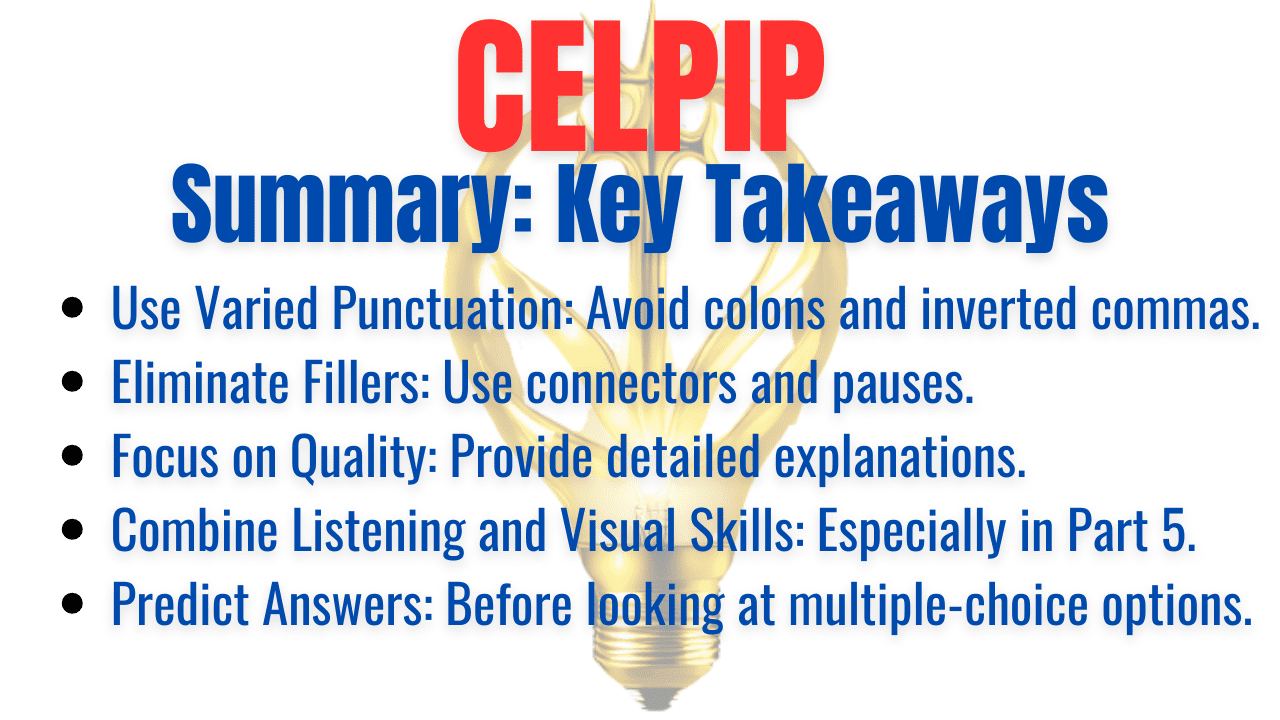
The Holy Grail of Writing: 10 Essential Tips for CELPIP and IELTS
Writing effectively in exams like CELPIP and IELTS requires adherence to certain principles that can significantly enhance your performance. In this guide, we’ll cover 10 essential tips that will help you become an expert writer. Whether you’re writing essays, letters, or general topics, these tips will ensure you produce high-quality content.
1. Explanation
Importance of Clear Explanations
Ensure your explanations are clear and simple enough that even a six-year-old could understand them. This does not mean using simple sentences, but rather explaining complex ideas in a straightforward manner.
Example:
- Before: “Climate change happens because of factories.”
- After: “Factories produce smoke, which releases pollutants into the air. These pollutants trap the sun’s heat within the earth’s atmosphere, causing global warming.”
2. Outline
Creating an Outline
An outline helps you stay organized and ensures you cover all necessary points. Before writing, jot down the main points and ideas for each paragraph.
Example Outline:
- Introduction: State the topic and your thesis.
- Body Paragraph 1: Main point and explanation.
- Body Paragraph 2: Supporting point and details.
- Conclusion: Summarize and restate the thesis.
3. Avoid Underexplaining and Overexplaining
Balance Your Explanations
Avoid underexplaining by providing enough detail for clarity. Conversely, avoid overexplaining by not repeating the same idea in different words.
Example:
- Underexplained: “Factories cause pollution.”
- Overexplained: “Factories emit smoke, which causes pollution. This pollution is due to smoke from factories.”
- Balanced: “Factories emit smoke, releasing pollutants into the air. These pollutants contribute significantly to air pollution.”
4. Grammar
Importance of Correct Grammar
Ensure your grammar is impeccable. Two to three minor errors are acceptable, but more can significantly reduce your score.
Resources:
- EnglishGrammar.org: Offers exercises and quizzes to improve your grammar.
- Grammarly: An online tool that checks your writing for grammatical errors.
- Professional Coaching: Hiring a teacher for personalized feedback can be very beneficial.
5. Avoid Filler Words
Eliminating Filler Words
In writing, filler words such as “um,” “you know,” “like,” and “so” should be replaced with more formal connectors or conjunctions.
Connectors and Conjunctions:
- For “and”: Use “furthermore,” “moreover,” or “likewise.”
- For “but”: Use “however,” “nonetheless,” or “nevertheless.”
- For “so”: Use “therefore,” “hence,” or “thus.”
6. Use Adverbs
Incorporating Adverbs
Adverbs (words ending in “ly”) add detail about how actions are performed, showcasing your range of vocabulary.
Examples:
- Quickly
- Slowly
- Efficiently
Example Sentence:
- Before: “The government should curtail drug addiction.”
- After: “The government should efficiently curtail drug addiction.”
7. Use a Thesaurus
Enhancing Vocabulary
A thesaurus helps replace basic words with more complex and varied vocabulary, making your writing more sophisticated.
Example:
- Before: “The party was good.”
- After: “The celebration was splendid.”
8. Avoid Contractions
Formal Writing
Avoid contractions like “I’ll” or “don’t.” Use the full forms: “I will” or “do not” to maintain formality.
9. Use Complex Sentences
Creating Complex Sentences
Complex sentences combine two related ideas into one sentence, showing your ability to handle advanced sentence structures.
Example:
- Simple: “I am excited today. I will go to a party.”
- Complex: “Since I am excited today, I will go to a party.”
10. Conclusion
Summarizing Your Points
Always conclude by summarizing your main points and restating your thesis. This reinforces your argument and provides closure.
Example:
- Conclusion: “In summary, factories contribute to pollution, which leads to climate change. Addressing this issue requires immediate and efficient action from the government.”
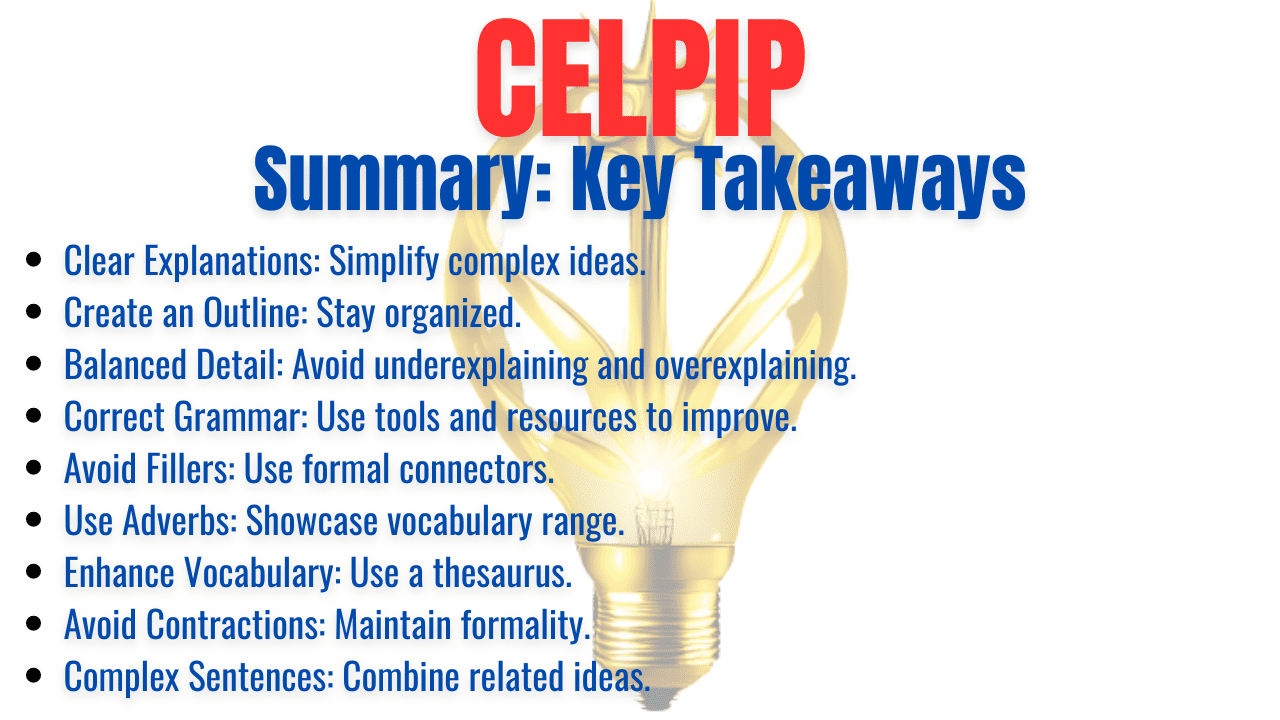
Why do students fail CELPIP? This course not only explains that but GUARANTEES your results or your MONEY-BACK! With 100,000 copies sold, check out why this course has internet’s best reviews (IMMEDIATE ACCESS AVAILABLE): Hzad Education Celpip Classes


